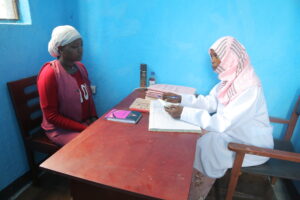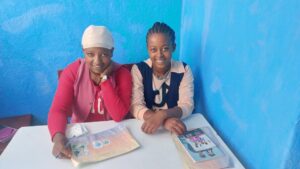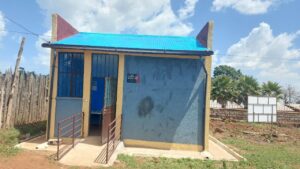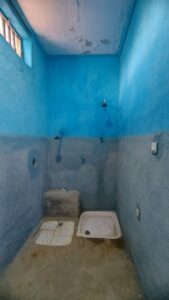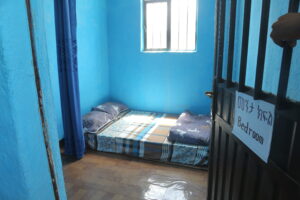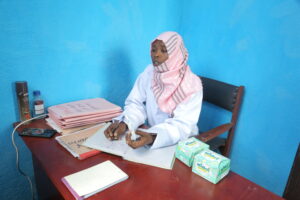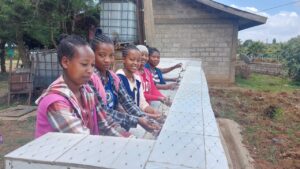A simple solution is making a big difference for girls’ education in Central Ethiopia. In EFY 2015, the Community-Led Accelerated WASH (COWASH IV) project constructed a Menstrual Hygiene Management (MHM) center at Fofa General Secondary School, Central Ethiopia Region, which has a student body of 1,084 with 462 of them being girls. This four-room haven offers a resting room, bathroom, waiting area, and counseling rooms. Today, the project celebrates the MHM center’s remarkable success in empowering girls and promoting educational equity.
Prior to the MHM center’s construction, many girls faced a critical barrier to education – a lack of access to proper hygiene facilities during their menstrual cycles. This often resulted in missed classes due to pain, discomfort and embarrassment.
The MHM center provides a safe space equipped with essential supplies and privacy. This seemingly simple solution has a profound impact on students like Kalkidan Banteayehu, a 12th grader. “Before the MHM center, I missed classes due to period pain,” Kalkidan shares. “Now, I can attend school regularly and focus on my studies without worry.” Mekdes Degefu, a 10th grader, expresses similar gratitude. “Having the MHM center means I don’t have to go home to rest when I have my period. This facility is crucial for all schools.”
The impact extends beyond individual students. Dedicated teacher Zara Ali has witnessed a noticeable change in the classroom environment. “The MHM center has created a sense of relief and stability among our female students,” Zara explains. “They are more attentive and engaged in learning. I am incredibly grateful to COWASH IV for building this center. Their initiative to expand the MHM program to other schools is commendable.”
Meaza Kebede, gender and disability inclusion specialist at COWASH IV, praises the Fofa MHM center as an exemplary facility. It adheres strictly to the Ministry of Education’s design guidelines, ensuring a functional and accessible space. The center is always open to provide support to students, with a dedicated counselor readily available. Meaza also commends the school for creating a welcoming environment that encourages girls to utilize the facility. These combined efforts will undoubtedly contribute to achieving the program’s goals, she emphasized.
While initial use of the MHM center was a challenge due to cultural stigmas, Zara and a few brave students who used it from the beginning championed awareness creation. Now, these efforts along with the ongoing MHM awareness campaigns within the school, many girls are embracing the facility. During a visit to the MHM center in late March, Meaza Kebede was impressed by the girls’ comfort and enthusiasm in using the facility. This positive observation, Meaza noted, is a testament to the growing awareness surrounding menstrual hygiene management among the students.
COWASH IV’s commitment goes beyond Fofa. Since the program’s inception, the project has constructed 19 MHM centers across 16 project Woredas, following the design provided by the Ministry of Education. Aiming to further expand this initiative, COWASH IV is carrying out an assessment in different project regions.
The COWASH IV MHM program goes beyond just building centers. The initiative includes creating awareness through MHM training and reusable sanitary pad production workshops for teachers across project regions. Additionally, comic books and brochures on menstrual hygiene management have been distributed to schools.
The success of the Fofa MHM center serves as a powerful example of how addressing basic needs can significantly improve educational attainment for girls in Ethiopia. By addressing menstrual hygiene needs and promoting menstrual health education, COWASH IV is empowering girls to stay in school and reach their full potential.
